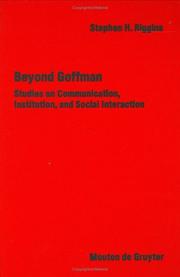| Listing 1 - 9 of 9 |
Sort by
|
Book
ISBN: 9781472482587 9780367897246 9781315582931 0367897245 9781317133544 1317133544 9781317133537 1317133536 1315582937 Year: 2018 Publisher: Taylor & Francis
Abstract | Keywords | Export | Availability | Bookmark
 Loading...
Loading...Choose an application
- Reference Manager
- EndNote
- RefWorks (Direct export to RefWorks)
This book is about Erving Goffman’s frame analysis as it, on the one hand, was presented in his 1974 book Frame Analysis and, on the other, was actually conducted in a number of preceding substantial analyses of different aspects of social interaction such as face-work, impression management, fun in games, behavior in public places and stigmatization. There was, in other words, a frame analytic continuity in Goffman’s work. In an article published after his death in 1982, Goffman also maintained that he throughout his career had been studying the same object: the interaction order. In this book, the author states that Goffman also applied an overarching perspective on social interaction: the dynamic relation between ritualization, vulnerability and working consensus. However, there were also cracks in Goffman´s work and one is shown here with reference to the leading question in Frame Analysis – what is it that’s going on here? While framed on a "microsocial" level, that question ties in with "the interaction order" and frame analysis as a method. If, however, it is framed on a societal level, it mirrors metareflective and metasocial manifestations of changes and unrest in the interaction order that, in some ways, herald the emphasis on contingency, uncertainty and risk in later sociology. Through analyses of social media as a possible new interaction order – where frame disputes are frequent – and of interactional power, the applicability of Goffman’s frame analysis is illustrated. As such, this book will appeal to scholars and students of social theory, classical sociology and social interaction.
Experience. --- Interaktion. --- Social interaction. --- Social psychology. --- Goffman, Erving, --- Goffman, Erving. --- Social psychology --- Goffman, Erving
Book
ISBN: 2760324982 2760324990 9782760324992 2760324974 9782760324978 9782760324985 Year: 2017 Publisher: Ottawa University of Ottawa Press
Abstract | Keywords | Export | Availability | Bookmark
 Loading...
Loading...Choose an application
- Reference Manager
- EndNote
- RefWorks (Direct export to RefWorks)
As disciplines become increasingly fragmented and compartmentalized, it is imperative to call to mind the ambiguous yet intertwined connections between social work and the sociological tradition in which Erving Goffman was trained. The authors of this work--social workers, sociologists, anthropologists, political scientists and nurses--open the "Goffman toolbox" to offer fresh perspectives on contemporary social work issues. The work focuses on a wide range of topics, including mental health, addiction, care for the elderly or persons with a disability and homelessness. Whether through an epistemological, theoretical, methodological or practical lens, the Goffmanian point of view is worthy of consideration. It suggests a way of observing the effects of institutions and social work categories on individuals. It goes beyond social workers' normative vision to identify the possibilities and restrictions they face. Finally, it accesses tacit, affective and sometimes unsuspected dimensions of the social question and of helping relationships, rendering visible what is not and intolerable, what is indeed tolerated. The seventeen contributors strive to bridge the gap that developed between the two disciplines as they struggled for institutional recognition.
Social service --- Sociology of social work --- Sociology --- Sociological aspects. --- Goffman, Erving. --- Sociological aspects --- Goffman, Erving, --- Social service - Sociological aspects --- Goffman, Erving, - 1922-1982

ISBN: 1134921381 1280338229 0203205502 9780203205501 0415064929 0415067723 9786610338221 6610338221 9780415064927 0415064929 9781134921331 9781134921379 9781134921386 9780415755719 1134921373 9780415067720 Year: 1992 Publisher: London New York Routledge
Abstract | Keywords | Export | Availability | Bookmark
 Loading...
Loading...Choose an application
- Reference Manager
- EndNote
- RefWorks (Direct export to RefWorks)
Decades after his death, the figure of Erving Goffman (1922-82) continues to fascinate. Perhaps the best-known sociologist of the second half of the twentieth century, Goffman was an unquestionably significant thinker whose reputation extended well beyond his parent discipline.A host of concepts irrevocably linked to Goffman's name - such as 'presentation of self', 'total institutions', 'stigma', 'impression management' and 'passing' - are now staples in a wide range of academic discourses and are slipping into common usage. Goffman's writings uncover a previously unnoticed pattern
Sociologists --- Social interaction. --- Human interaction --- Interaction, Social --- Symbolic interaction --- Exchange theory (Sociology) --- Psychology --- Social psychology --- Goffman, Erving. --- Goffman, Erving, --- גופמן, ארווינג --- Sociologists - United States - Biography --- Social interaction --- Goffman, Erving, - 1922-1982 --- Goffman, Erving

ISBN: 1134832273 1280332840 0203019008 0203296877 9780203296875 9780203019009 9780415112048 0415112044 9786610332847 6610332843 0415112044 9781134832224 9781134832262 9781134832279 9780415756419 1134832265 Year: 1999 Publisher: London New York Routledge
Abstract | Keywords | Export | Availability | Bookmark
 Loading...
Loading...Choose an application
- Reference Manager
- EndNote
- RefWorks (Direct export to RefWorks)
This collection brings together many of today's leading sociologists to pursue and build upon the diverse aspects of Goffman's legacy and to discuss key topics of his work.
Social structure. --- Social interaction. --- Human interaction --- Interaction, Social --- Symbolic interaction --- Exchange theory (Sociology) --- Psychology --- Social psychology --- Organization, Social --- Social organization --- Anthropology --- Sociology --- Social institutions --- Goffman, Erving. --- Goffman, Erving, --- גופמן, ארווינג --- Goffman, Erving
Book
ISSN: 11501367 ISBN: 2713214122 271323090X 9782713214127 Year: 2001 Volume: 12 Publisher: Paris : Editions de l'Ecole des Hautes Etudes en Sciences Sociales - EHESS,
Abstract | Keywords | Export | Availability | Bookmark
 Loading...
Loading...Choose an application
- Reference Manager
- EndNote
- RefWorks (Direct export to RefWorks)
L'analyse de l'action collective a été dominée, ces dernières décennies, par des modèles conçus en fonction d'un terme central : la mobilisation de ressources. Certes, la sociologie des « nouveaux mouvements sociaux » a proposé d'autres explications. Mais elle a montré ses limites pour rendre compte de plusieurs dimensions importantes de l'action collective : travail de la signification, constitution de causes publiques, diagnostic de situations, organisation durable de collectifs et motivation de l'engagement de leurs membres. L'« analyse de cadres » - l'expression renvoie à l'ouvrage d'Erving Goffman, Frame Analysis - représente une tentative récente pour combler ces lacunes. Focalisée sur la mise en forme culturelle de l'action collective, elle s'est intéressée aux processus de cadrage selon lesquels sont configurés des champs d'action et d'identité, définies des situations sociales, mobilisés des militants et des publics, suscités et maintenus des engagements. Ce volume présente et discute les outils de cette analyse ; il fait aussi apparaître de nouvelles limites. Une démarche plus pragmatiste, attentive aux « vocabulaires de motifs » et aux « grammaires de la vie publique », ne serait-elle pas mieux à même d'identifier et de comprendre les contraintes formelles de l'action collective?
Social movements --- Collective behavior --- Social participation --- Mouvements sociaux --- Comportement collectif --- Participation sociale --- Social action --- Goffman, Erving, --- Social movements. --- Social action. --- Goffman, Erving. --- Social policy --- Social problems --- Movements, Social --- Social history --- Social psychology --- Goffman, Erving, - 1922-1982. - Frame analysis --- Goffman, Erving, - 1922-1982 --- arène --- action collective --- cadre --- motif --- problème public --- publique

ISBN: 0585478880 9780585478883 0742519775 0742519783 Year: 2003 Publisher: Lanham, Md. Rowman & Littlefield
Abstract | Keywords | Export | Availability | Bookmark
 Loading...
Loading...Choose an application
- Reference Manager
- EndNote
- RefWorks (Direct export to RefWorks)
Erving Goffman (1922-82) was arguably one of the most influential American sociologists of the twentieth century. A keen observer of the interaction order of everyday life, Goffman's books, which have sold in the hundreds of thousands, continue to be widely read and his concepts have permanently entered the sociology lexicon. This volume consists of twelve original essays, all written by prominent Goffman scholars, that critically assess Goffman's many contributions to various areas of study, including functionalism, social psychology, ethnomethodology, and feminist theory.
Social interaction. --- Sociologists - United States - Biography. --- Sociology - United States. --- Sociologists --- Sociology --- Goffman, Erving.

ISBN: 0791487776 1417520507 9781417520503 0791455408 9780791455401 0791455394 9780791455395 9780791487778 Year: 2003 Publisher: Albany State University of New York Press
Abstract | Keywords | Export | Availability | Bookmark
 Loading...
Loading...Choose an application
- Reference Manager
- EndNote
- RefWorks (Direct export to RefWorks)
In this unique analysis of three prominent theorists of modern sociology, theory is understood as implicitly, but importantly, reflecting especially modern problems of individual and social life. From the grand-theoretical systems of Talcott Parsons to the unique symbolic interactionism of Erving Goffman and the radically mundane ethnomethodology of Harold Garfinkel, a wide variety of noted sociological theories have addressed central issues of sociology against the backdrop of modern society. When this modern backdrop is brought into the foreground of analysis, sociological theories assume new depth and breadth and new historical significance. The author outlines features of the modern experience, drawing upon neglected cultural theorists of modernity, and then shows how these features of modernity are reflected and incorporated in the scholarship of Parsons, Goffman, and Garfinkel. The result is an original and eclectic analysis that illuminates previously overlooked dimensions to modern sociological theory, and suggests new possibilities for meaningful and rewarding comparisons between theoretical traditions.
Civilization, Modern --- Sociology --- Philosophy. --- History --- Garfinkel, Harold. --- Goffman, Erving. --- Parsons, Talcott, --- Parsŭnz, Tolkŭt, --- Parsons, Tolkott, --- Pāsonzu, Tarukotto, --- Goffman, Erving, --- גופמן, ארווינג --- #SBIB:316.21H10 --- #SBIB:316.21H70 --- 316.2 GARFINKEL, HAROLD --- 316.2 GOFFMAN, ERVING --- 316.2 PARSONS, TALCOTT --- 316.2 GOFFMAN, ERVING Sociologische richtingen. Sociologische scholen. Sociologen--GOFFMAN, ERVING --- Sociologische richtingen. Sociologische scholen. Sociologen--GOFFMAN, ERVING --- 316.2 GARFINKEL, HAROLD Sociologische richtingen. Sociologische scholen. Sociologen--GARFINKEL, HAROLD --- Sociologische richtingen. Sociologische scholen. Sociologen--GARFINKEL, HAROLD --- 316.2 PARSONS, TALCOTT Sociologische richtingen. Sociologische scholen. Sociologen--PARSONS, TALCOTT --- Sociologische richtingen. Sociologische scholen. Sociologen--PARSONS, TALCOTT --- Philosophy --- Het functionalisme en systeemdenken in de theoretische sociologie --- Interpretatieve sociologie --- Goffman, Erving
Book
ISBN: 0367897245 1317133544 1317133536 1315582937 1472482581 Year: 2018 Publisher: Taylor & Francis
Abstract | Keywords | Export | Availability | Bookmark
 Loading...
Loading...Choose an application
- Reference Manager
- EndNote
- RefWorks (Direct export to RefWorks)
This book is about Erving Goffman’s frame analysis as it, on the one hand, was presented in his 1974 book Frame Analysis and, on the other, was actually conducted in a number of preceding substantial analyses of different aspects of social interaction such as face-work, impression management, fun in games, behavior in public places and stigmatization. There was, in other words, a frame analytic continuity in Goffman’s work. In an article published after his death in 1982, Goffman also maintained that he throughout his career had been studying the same object: the interaction order. In this book, the author states that Goffman also applied an overarching perspective on social interaction: the dynamic relation between ritualization, vulnerability and working consensus. However, there were also cracks in Goffman´s work and one is shown here with reference to the leading question in Frame Analysis – what is it that’s going on here? While framed on a "microsocial" level, that question ties in with "the interaction order" and frame analysis as a method. If, however, it is framed on a societal level, it mirrors metareflective and metasocial manifestations of changes and unrest in the interaction order that, in some ways, herald the emphasis on contingency, uncertainty and risk in later sociology. Through analyses of social media as a possible new interaction order – where frame disputes are frequent – and of interactional power, the applicability of Goffman’s frame analysis is illustrated. As such, this book will appeal to scholars and students of social theory, classical sociology and social interaction.
Social psychology. --- Social interaction. --- Experience. --- Goffman, Erving. --- Knowledge, Theory of --- Philosophy --- Psychology --- Reality --- Pragmatism --- Human interaction --- Interaction, Social --- Symbolic interaction --- Exchange theory (Sociology) --- Social psychology --- Mass psychology --- Psychology, Social --- Human ecology --- Social groups --- Sociology --- Goffman, Erving, --- גופמן, ארווינג --- anaylsis --- book --- chess --- frame --- Goffman --- impression --- management --- online --- order --- sociology --- social interaction --- interaction --- social media --- Goffman, Erving

ISBN: 3110122081 9783110847291 3110847299 0899256139 9780899256139 9783110122084 Year: 1990 Volume: 96 Publisher: Berlin New York Mouton de Gruyter
Abstract | Keywords | Export | Availability | Bookmark
 Loading...
Loading...Choose an application
- Reference Manager
- EndNote
- RefWorks (Direct export to RefWorks)
Beyond Goffman: Studies on Communication, Institution, and Social Interaction (Approaches to Semiotics).
Goffman, Erving --- Congresses --- Social interaction --- Communication --- Social aspects --- Goffman, Erving - Congresses. --- Social interaction - Congresses. --- Communication - Social aspects - Congresses. --- 316.277 --- 316.77 --- #SBIB:309H021 --- #SBIB:316.21H71 --- #SBIB:309H02 --- 316.77 Communicatiesociologie --- Communicatiesociologie --- 316.277 Ethnomethodologie. Fenomenologische sociologie. Interactie. Symbolisme. Blumer. Schutz. Garfunkel--(sociologische scholen) --- Ethnomethodologie. Fenomenologische sociologie. Interactie. Symbolisme. Blumer. Schutz. Garfunkel--(sociologische scholen) --- Intra- en interpersonele communicatie --- Theoretische sociologie: symbolisch interactionisme --- Communicatiewetenschap: algemeen --- Goffman, Erving, --- גופמן, ארווינג
| Listing 1 - 9 of 9 |
Sort by
|

 Search
Search Feedback
Feedback About UniCat
About UniCat  Help
Help News
News